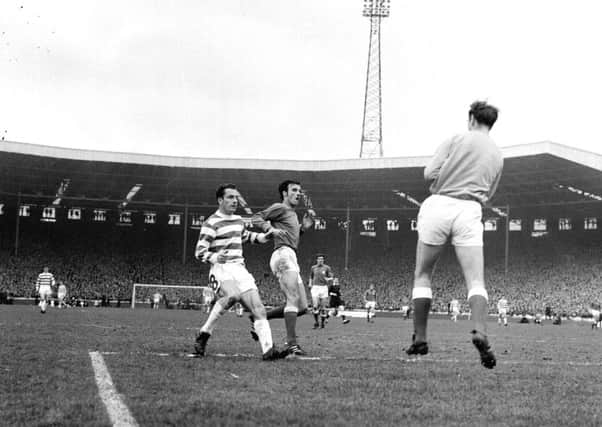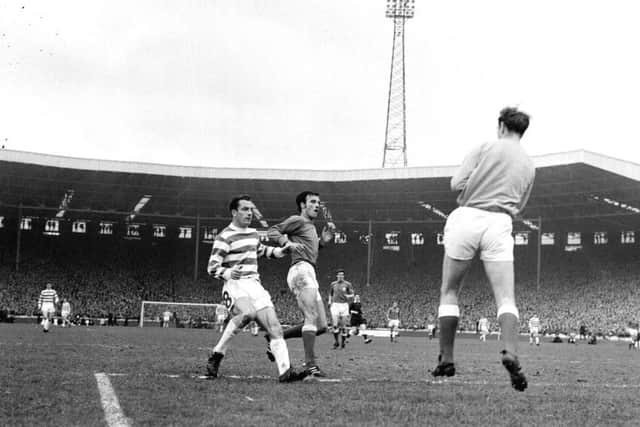Stevie Chalmers: The man who survived tuberculosis against all odds - thanks to Rangers fan


Chalmers completed the comeback as 11 men from within a 30-mile radius of Glasgow beat favourites Inter Milan 2-1 to win the European Cup in 1967.
But he won his biggest battle more than a decade earlier after contracting tuberculosis meningitis aged 20 and given just weeks to live.
Advertisement
Hide AdAdvertisement
Hide Ad

His survival was hailed as a “triumph of modern medicine” and he went on to fulfil his dream of playing for Celtic, scoring 231 goals and winning 15 trophies.
Born Thomas Stephen Chalmers on Boxing Day 1935, the youngest of five siblings was introduced to football during his early years in Glasgow’s east end.
Chalmers would head the ball against the wall of an air raid shelter and practise with his father David, a factory worker who formerly played for Clydebank alongside Celtic’s record goalscorer, Jimmy McGrory.
He left school aged 14 and worked in a tool shop and furniture warehouse, but his goal was to become a footballer. He played for Kirkintilloch Rob Roy and featured in FA Cup preliminary rounds for Newmarket Town during national service at RAF Stradishall, but fell seriously ill following his return to Glasgow. Tuberculosis bacteria had entered the fluid surrounding his brain and spinal cord.
Chalmers spent six months in Belvidere Hospital, next to Celtic Park, but found a saviour in Peter McKenzie, who pioneered the treatment of draining spinal fluid. Dr McKenzie later told Chalmers he was the first of his patients to get out alive and presented the case as a “triumph of modern medicine” during conferences in North America.
Speaking to The Scotsman in 2012, Chalmers recalled his treatment. “I didn’t know what it was, or what it meant for me,” he admitted.
“I was getting lumbar punctures; kneeling on the bed, a nurse holding me in position while a doctor went in with his syringe,” he recalls. “Boy, that was tough, although in the early days I still didn’t think my condition was too serious. “Then I noticed how my fellow patients kept disappearing. The curtains would be dragged right round their beds before they were wheeled away. I wasn’t allowed to do very much which for a young sportsman was hard.
Advertisement
Hide AdAdvertisement
Hide Ad“When no one was looking I’d drop my legs over the side of the bed to try and get them moving. I’d like to think my good health and fitness helped me. “I know that Dr Peter McKenzie helped me. He was the head consultant at the Belvidere and after I’d made a full recovery he let me see a film he’d made of my treatment which he was going to show round Canada and the United States. “He told me that no one with tuberculosis meningitis had been walking out of the hospital alive. I suppose I was his star patient.”
After rediscovering his fitness by road running and chasing after buses, Chalmers played for Ashfield and won Scotland Juniors honours in January 1959. Weeks later he joined Celtic despite receiving bigger financial offers from elsewhere.
He scored on his Old Firm debut - the 1960 Scottish Cup final - and would be congratulated for the goal in a letter from Dr McKenzie, a Rangers fan, again hailing him as “a triumph of modern medicine”.
However, Celtic were beaten in the replay and the Light Blues went on to win the trophy.
• READ MORE - Interview: Stevie Chalmers, Celtic legend
Chalmers soon became a regular goalscorer but the early 1960s were barren years for Celtic with chairman Robert Kelly often overruling Jimmy McGrory, then manager, on team matters. He would go into work early to hone his skills, believing that his illness meant he had to work harder than his team-mates, but he was ordered to leave the ball alone and run round the pitch. Chalmers grew disillusioned but never thought of leaving.
Things changed dramatically when Jock Stein took over as manager in March 1965, having been promised full control. Celtic won the Scottish Cup a month later - their first trophy in eight years - and kept on winning as the tactically-shrewd Stein utilised Chalmers’ pace and movement.
The high point came in May 1967 when Chalmers’ deft touch in Lisbon completed a clean sweep of trophies and continued his record of scoring in every round of the club’s first European Cup campaign.
Chalmers later said: “That goal has brought me nothing but happiness. My only tinge of regret is that my father never got to see it; he had passed away shortly before we got to the final in Lisbon. “It would have been lovely for him to see that.”